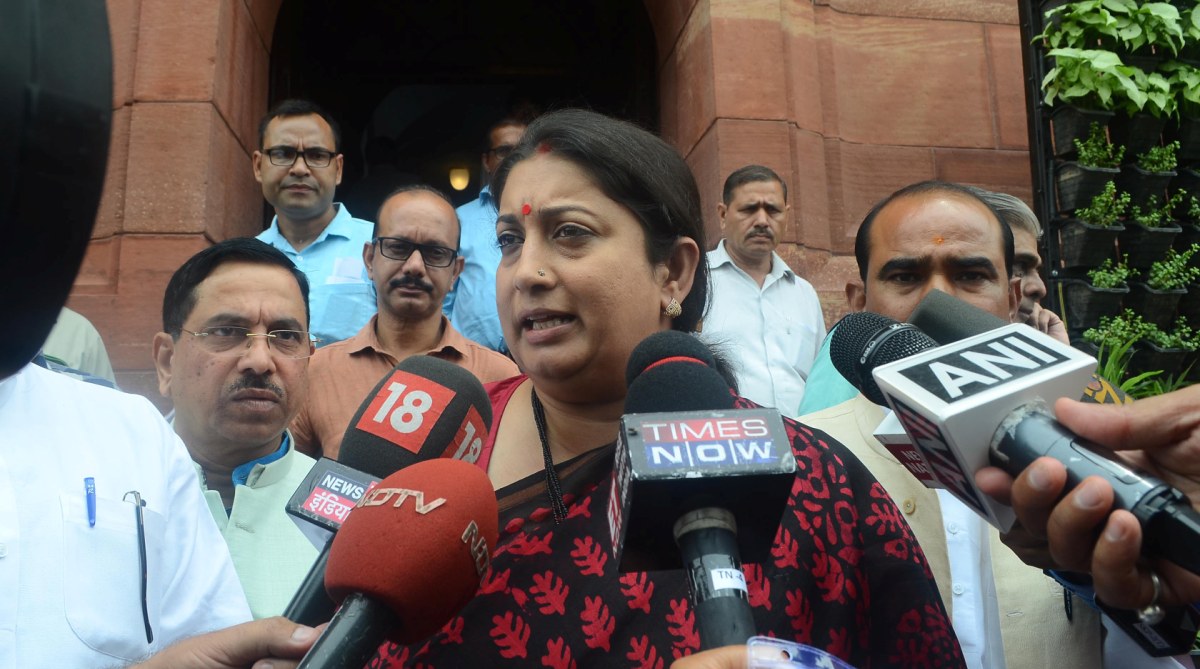PM Modi on 3-day visit to 3 states–MP, Bihar, Assam–from Sunday
According to the Prime Minister’s Office (PMO), the Prime Minister will visit Madhya Pradesh, Bihar and Assam from February 23-25.
Irani on Tuesday waded into the Sabarimala issue by asking if it was proper for anybody to desecrate a place of worship to justify the right to pray.

Smriti Irani
A complaint was lodged in a Sitamarhi court on Thursday against Union minister Smriti Irani for her alleged remarks on allowing women of menstruating age into the Sabarimala temple in Kerala.
Irani had found herself mired in controversy after she said at an event in Mumbai on Tuesday that women had a right to pray but “not desecrate” places of worship.
Advertisement
The complaint was lodged before the court of Chief Judicial Magistrate, Sitamarhi, Saroj Kumari by advocate Thakur Chandan Singh. Thakur Chandan Singh has made protesters against entry of women into the shrine as party in the case.
Advertisement
On September 28, the Supreme Court lifted the ban on entry of women of menstrual age into the Sabarimala temple. However, women were stopped by protesters from climbing up the hill top shrine.
The complaint has been lodged under Sections 120B (criminal conspiracy to commit offence punishable with death), 124A (sedition), 353 (deterring public servant from discharge of duty) and 354 (outraging the modesty of a woman) of the Indian Penal Code.
The matter is likely to come up for hearing on October 29.
Irani on Tuesday waded into the Sabarimala issue by asking if it was proper for anybody to desecrate a place of worship to justify the right to pray.
“It is plain common sense… Will you take sanitary napkins soaked in menstrual blood to a friend’s home? You will not. Do you think it is respectful to do the same when you enter the house of God?” Irani asked, speaking at an event.
Seeking to point out the difference, Irani said: “Everyone has the right to pray, but not to desecrate.”
Irani’s remarks attended a Young Thinkers’ Conference organized by the British Deputy High Commission and think-tank, Observer Research Foundation (ORF).
She made it clear that these were her personal views and as a cabinet minister, she would not comment on the Supreme Court’s recent verdict opening the Sabarimala Temple precincts to women of all ages.
Drawing parallels with the Sabarimala sentiments, the Hindu-born Irani referred to her own marriage with a Parsi community man, (Zubin).
“I am a Hindu married to a Parsi, but I have ensured both my children practise Zorastrianism. Both have performed their Navjot ceremony. When I took by infant son to a fire temple (Agiary) in Andheri, I had to hand him to my husband. I was asked to go away from there,” she recounted.
Since then, Irani said, as she is not allowed to accompany her husband and kids to any fire temple, she waits for them outside or in the car.
(With inputs from agency)
Advertisement